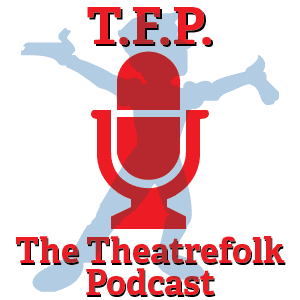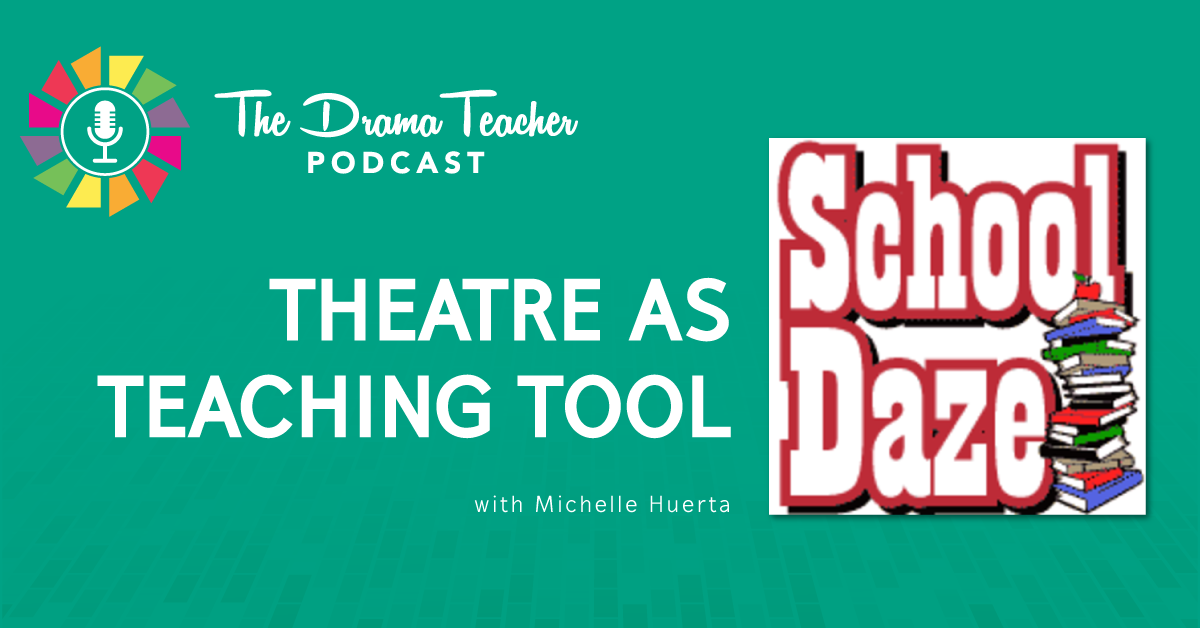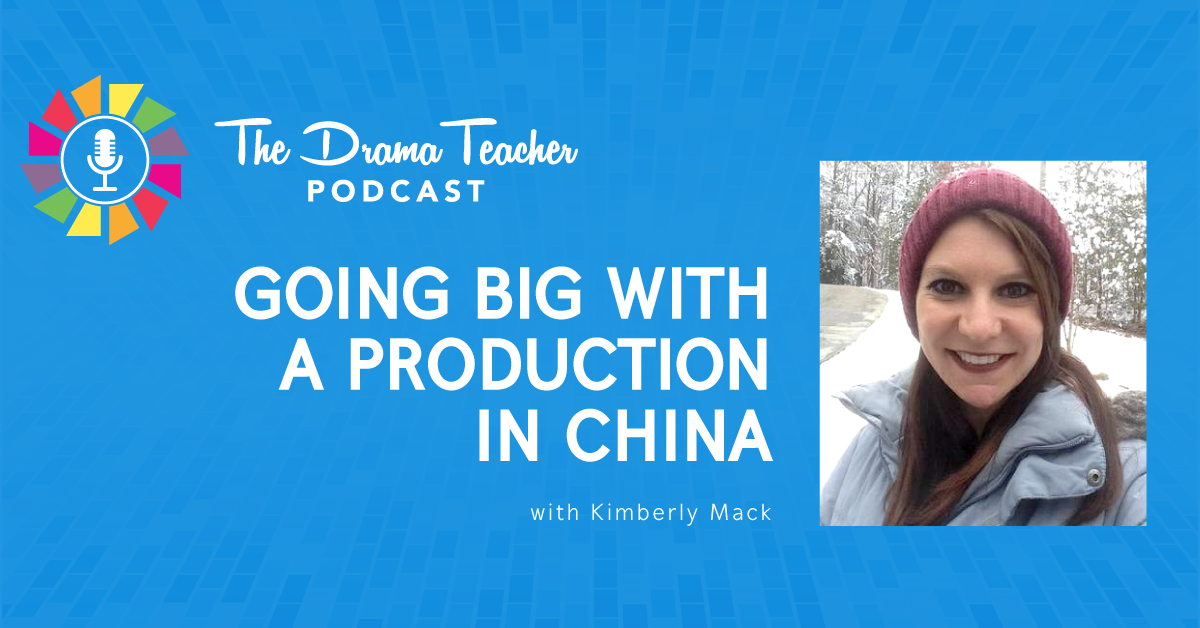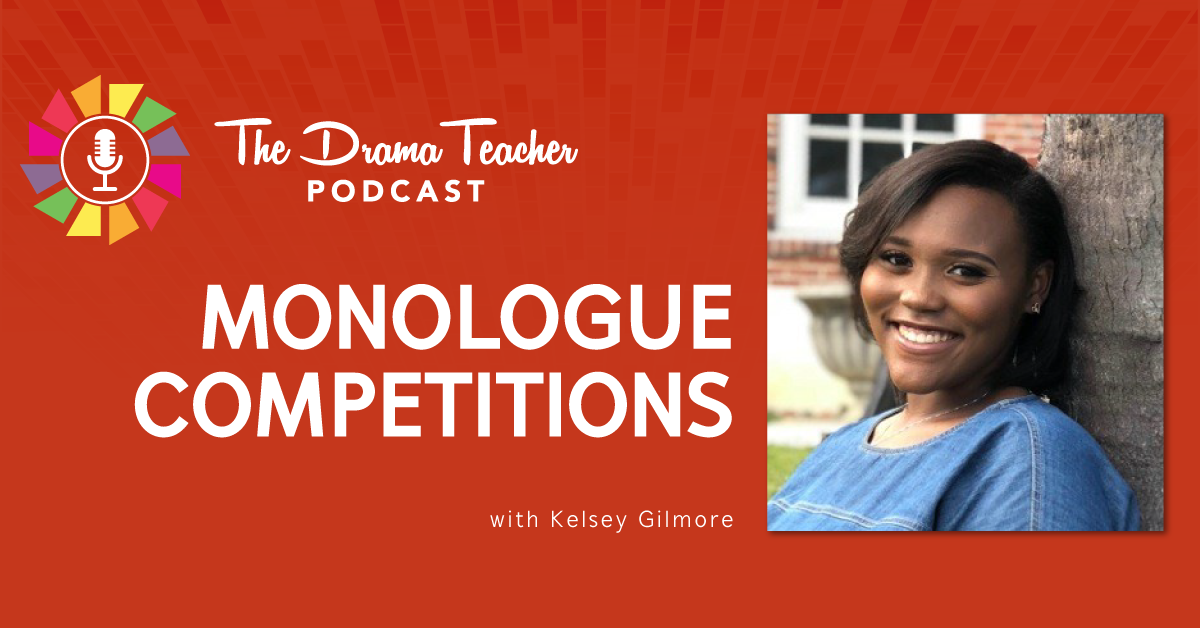Introducing TFP – The Theatrefolk Podcast
Look at this, a special post during our vacation!
Well, truth be told we’re not really on vacation, just taking a break from the blog. We’re working on lots of new projects for the upcoming year. One of which is a weekly podcast that will be available through iTunes. In order to submit a podcast to iTunes, we have to have one all ready to go and post it on our blog. Hence, the special post during our vacation.
The podcast will be a weekly thing, once we get accepted by iTunes… which we don’t know when that will be. Could take a day, could take a month. So, enjoy a sneak peak at TFP – The Theatrefolk Podcast where we look at playwrights, performances and the world of theatre from a human (and slightly dorky) perspective.
Episode 1: First Podcast
In the first episode of TFP Lindsay shares the aim of the podcast and how talking on the mic is going to take her way out of her comfort zone because speaking is not her best feature. She reveals why writing rather than speaking is a much preferred journey; the path from the brain to the pen is something long and luxurious while the path from the brain to the mouth is short and often ends in a flood of stupidity.
QUESTION OF THE DAY : What is your best method of communication with the outside world?
Show Notes:
Podcast Transcript
Welcome to TFP, that stands for the Theatrefolk Podcast. I am Lindsay Price, the resident playwright for Theatrefolk. Hello, I hope you’re well. Thanks for listening.
Episode One: First Podcast
This is the very first podcast of TFP. The aim of which is for me to sit in front of a mike and share what’s new here at Theatrefolk Global Headquarters as well as thoughts on playwriting, on performance, on theatre, on the writing process. I have a hard time when it comes to a lot of “theatre” blogs or “theatre” podcasts. And I listen to a number of them and they really seem to approach theatre in a very dry way – very analytical, pedagogical. Nothing makes my eyes roll back faster into my head that the word pedagogical, angry blogs that talk about the death of theatre and I just don’t connect to theatre in that way at all. For me theatre is human. It’s a little bit, scruffy is the wrong word, a little bit dog-eared. It’s not shiny. I think that’s what I’m trying to say. It’s not perfect. It’s dorky. It’s stuttery. It’s immediate and intimate. I like the human connection in theatre more than splashy spectacle. Maybe that’s why I’m pretty small scale in the theatre world because that’s my experience in theatre. It’s very life changing in the small. So stuttery and dorky suit me just fine. So the goal here is to share the stuttery, the dorky and the human world of theatre.
But first, let’s do some Theatrefolk News. So today’s feature is our brand new Emergency Lesson Plan eBook. I have seen teachers go wide at the eyes at the idea of an Emergency Lesson Plan book and we’ve got one specifically for drama teachers and drama classes. It’s great for rainy day, for a substitute when you need to throw something in at the last minute. Every lesson plan has an instruction sheet and covers everything from acting exercises, playwriting, theatre history, reader’s theatre. But wait, there’s more. The ELP is an eBook. So that means it comes to you as a PDF. The ELP is PDF, say that five times faster. So you can print one off, throw it up on the smart board. We love it. It’s very pretty and very useful for the drama classroom. You can find all the info on the Theatrefolk website at www.theatrefolk.com. Look under the resources tab.
This podcast is a very new venture for me. I’m pretty nervous at the idea of sitting and talking. I like doing new things creatively so it’s important to do new things, to approach your work from a new perspective, turn things around. I wish I had a different word than thing; turn things upside down. But the idea of sitting down and talking into a mike about what I do and how I feel about what I do is really out of my comfort zone. And I’ll be honest, I am cheating. I am cheating here as I get started with coming up with episodes, I have notes. I have a crutch. I’m not ashamed to say it. It’s totally cheating, I am well aware. Here I am talking about how wonderful it is to try new things and to be totally new and I’m cheating. I admit it, I’m a cheater. At some point, I will do this without the crutch. But now I’m in pretty much full crutch mode. So I guess I want to learn how to swim before diving into the pool, is that bad? To wade in, sort of gradually, in one of those pools with a zero entry where you just sort of like get in little bit by little. Let me think about that. She said reading off of her notes.
The concept of speaking is not something I am not comfortable with and it’s not my best feature. My best feature is my collar bones. Now, have you ever been in an interview and they start asking those questions in your job interview what is your best feature? What is your weakness? And you just want to say, the job is great for me, I’ll do a great job. Can I just say I’m going to do a great job? You hire me and we don’t have to do all this. I get a headache when I have to fill out grand applications because it’s the same thing. You have to write in circles about artist statements and goals, and what are going to do if it doesn’t work out… Blah… Blah… Blah… when all you really want to say is I write good. Give me money.
So, best feature not talking. I read well and I write well. There is a very specific reason why I am a writer. When I write, I feel like I’m talking through my fingers that there’s little voices coming out of my finger tips like there’s an image. I guess it’s the synopsis of what I do. Talking through my fingers, coming up with words for characters to say but it’s really, again, about comfort. There’s comfort in coming up with something to say and writing it down rather than just saying it. There’s a longer path between thought and action. Idea in brain, down arm to pen and paper and then out into the world and the words seem to emerge better. See? I can’t talk. The words come out more fully-formed, more concise, less stupid. A huge fear of mind is saying stupid thing and I am a grand master, clash champion, I’m saying things stupidly. So I think that’s why I just… The writing of them is so much more comfortable. Because in contrast to the writing is the speaking journey and when I speak, the path just simply – brain mouth. Idea in brain, out mouth, it’s a very short trip and it doesn’t always go well. And sometimes it’s so short, I end up with nothing. I can’t speak and then nothing comes out of my mouth. Nothing comes out of my mouth. I am amazed at people who can talk, who can strike up a conversation with a stranger, people who have something to say. There are some people who I wish had less to say, who I would like to say, can you please stop talking?
I was teaching a workshop at a bunch of schools in a town once and there was a person taking me from school to school and I think within the first hour, she was talking about dealing with her afterbirth. That’s too much, that’s too much talking. And I was on a plane this year beside two fifteen-year old girls and the flight was two and a half hours long and they started talking the moment they sat down and they did not stop talking when they were leaving the plane. It’s two and a half hours and I have never have spoken for two and a half hours. It really freaks me out. Speaking is foreign. The act of conversation is unnatural. I don’t like it. I was at physiotherapy this week and I knew the woman working on me was throwing out, lobbing out the questions, points of view in order to start a conversation and I couldn’t do it. That’s a short trip, brain mouth, leaves me speechless, very uncomfortable. There’s nothing worse than the awkward silence when I know I’m supposed to be speaking. Speaking is supposed to be happening and I can’t figure out how to make it happen. It makes me insanely anxious. I am not a child. I should be able to answer questions and ask them in return.
People laugh at Craig and I because sometimes we’ll Facebook chat when we’re in the same room. We are essentially in the room. We are looking at each other, both on our computers. And instead of speaking, we’ll start typing and it’s comfortable. It’s lovely. We have lovely chats. I have so much more to say when I’m writing. No awkward silences, it’s all very comfortable, easier to breathe, more time. I can take all the time I want or need. There’s a very long luxurious journey between my brain and my pen. The ability to rewrite and refine, I can make sure what’s on the pages, what I want to say. I’ve got time to figure out something out. I love coming up with stuff for my characters to say whether it’s funny or sarcastic or honest or vulnerable, something that reveals a character detail. It’s very amazing. It’s absolutely amazing. It’s the most amazing part of my job. And it’s kind of ironic that this journey from my brain to my pen and the stuff that comes out of my fingers is very reliable. They never forget what’s coming down the pipe from my brain and they’re able to put the words on the page and that all goes very well. And they’re able to write or type exactly what I want, word after word after word. And it’s amazing how well my fingers talk for me because my fingers actually have a horrible memory. I have very flawed fingers and they’re great for writing and they suck at piano. I played piano for years and something that has always held me back, aside from a great aversion to regular practicing is my memory. I just couldn’t remember anything when it comes to playing the piano to the point I stopped telling people even when I played that I played because they would want me to play something and I never could. And I don’t often tell people, even now that I played for so many years, because they’ll ask me to play something and it’s embarrassing to say, well I can’t do it. I couldn’t even play chopsticks.
And that path from my brain to my fingers, the path that comes to piano, it is inherently broken. It doesn’t work. My fingers don’t remember anything. I did a play in university where my role was the piano player and I had about ten songs to learn and I practiced my ass off. And I played and I played and I played and it worked and it worked and it worked. During tech week, I was sitting off to the side and I was watching one of the other actors who was just sitting at the piano. Not playing, just sitting, a place to sit. And the stage manager asked him to play something for sound levels. And this guy flexed his fingers and he just started playing stuff like fooling around, like off the top of his head. And it was very easy. It was light and I had practiced my ass off and I had practiced so hard and there’s no way I could have sat down and played something else just fooling around. I never fool around.
So whatever path that goes from my brain to my fingers for piano is gnarled and twisty and covered with fallen trees and weeds and asphalt. And the path that goes from my fingers to my brain for playwriting is a beautiful, smooth, wide path lined with flowers, bunnies run across it, people holding hands as they walk down the promenade and it’s so weird to me. And I don’t understand how the two paths which are basically the same from brain down your arm and out your fingers. And then I don’t understand how it could be so different, like what is the difference and why? Well, if I could solve that mystery, it’s probably… That is only probably experienced by me and probably requires some science which I stopped taking in the 10th grade. I guess it’s going to have to remain a mystery. But at the end of the day, I would rather write plays than play piano. That’s one of my great disappointments in myself actually, not disappointing enough that I’m going to do something about it. But I love the ability to play the piano but I just don’t love it enough to make it a habit. Not enough that I would hear anyone, that I would want anyone to hear me practice or stumble around.
So with this all is a very grand circle around to, is that I would rather write than talk. But I’m going to spend some time. I’m going to talk to you. If there’s a theatre topic or a question or something you’d like to hear discussed. I’m really annoyed with complete lack of vocabulary and I don’t like that I’ve used the word “thing” a number of times. I have world’s worst vocabulary. So hang on, I’m going to go to dictionary.com. Okay I’m now looking up other words for the word thing. So we have being, body, facets, tractor, statements, thoughts, concepts, stuff, point, elements, and some of the world. I don’t know if those are of any help.
Okay so another thing that I would like to try and do for all of these is sort of end on a question of the day. So I’m going to try and come up with a thing, thought, facet, statement, something that I throw into the atmosphere that you may or may not respond to. So here’s the one for the first podcast. It took me years to figure out my specific communication tool and just the fact that writing is more comfortable for me than speaking and maybe that’s okay. The manner of communication which I express myself in the best way is that pen and paper. Writing is more comfortable, more effective, more efficient and so, what is the way in which you excel when it comes to communication? What is the mechanism that is the most comfortable, the most effective, the most efficient? How do you get what you want to say across the best? Is it speaking? Is it writing? Is it Math? Is it Dance? Is it Art? How do you communicate to the world?
And that’s where we’re going to end – First podcast. Woot! Holla! That’s the doctor part. Okay, that’s it. That’s all. Take care my friends, take care.



